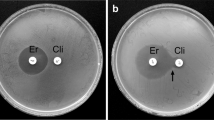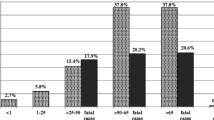Abstract.
Over the last decade vancomycin-resistant enterococci (VRE) have emerged as nosocomial pathogens. The aim of this study was to determine the prevalence of VRE in clinical samples from hospitalized patients in the Canary Islands. From April to November 2000, 437 enterococci were isolated from patients hospitalized at the four main health care centers in those islands. Identification to the species level was performed with the GPS-TA (Vitek 1) or the Wider I system. A PCR assay was used to determine the genotype of glycopeptide resistance (vanA, vanB, vanC1, and vanC2/C3 genes). Only three (0.7%) VRE were detected: one vanA Enterococcus faecalis, and two vanC1 Enterococcus gallinarum. To our knowledge, this is the first VRE study carried out in the Canary Islands hospitals, and the results showed a low prevalence of VRE.
Similar content being viewed by others
Author information
Authors and Affiliations
Additional information
Electronic Publication
Rights and permissions
About this article
Cite this article
Pérez-Hernández, X., Méndez-Álvarez, S., Delgado, T. et al. Low prevalence of vancomycin-resistant enterococci in clinical samples from hospitalized patients of the Canary Islands, Spain. Int Microbiol 5, 117–120 (2002). https://doi.org/10.1007/s10123-002-0075-y
Received:
Accepted:
Published:
Issue Date:
DOI: https://doi.org/10.1007/s10123-002-0075-y




